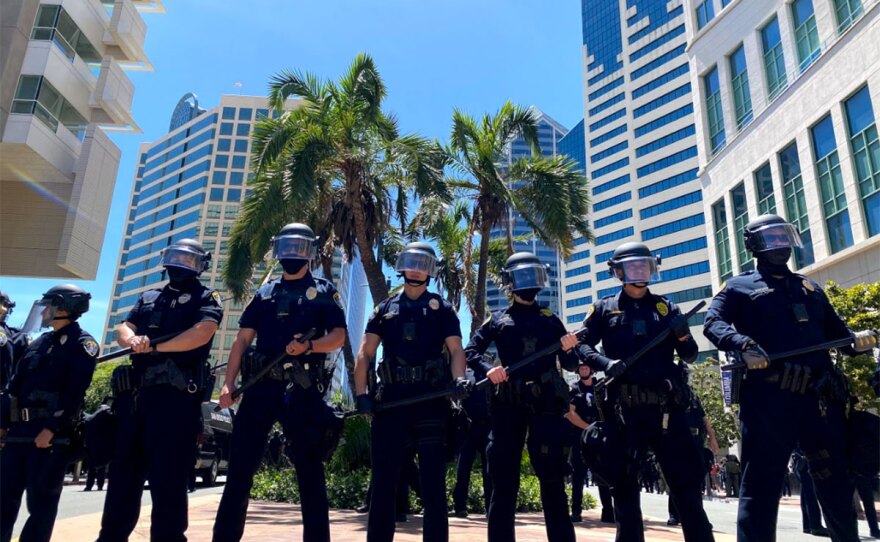The San Diego City Council is calling for data-driven policy changes and more community conversations in response to the latest report detailing racial disparities in San Diego policing.
“We must act and we must do it now,” said Councilmember Sean Elo-Rivera.
Released earlier this month, the Center for Policing Equity’s report was commissioned by the San Diego Police Department in 2019.
The report examined data from 2016 through 2020 provided by the San Diego Police Department. It specifically looked at traffic stops, other types of police stops and use of force.
The Center for Policing Equity, an independent research organization that describes its mission as using data science to end bias in policing, found the following:
• Black San Diegans are 4.2 times more likely than their white counterparts to be stopped for a non-traffic violation, even when controlling for crime rates, poverty rates and neighborhood demographics.
• Black people make up nearly 25% of non-traffic stops in San Diego, but comprise only 6.1% of the population.
• During traffic stops, Black San Diegans are searched 2.5 times more often than white people, and Latinx people are searched 2.2 times more than white people.
• Black people are subjected to use of force, such as holds or takedowns, 4.8 times more often than their white counterparts.
These findings echo the results of a number of previous reports, including The San Diego Union-Tribune’s 2021 analysis, Campaign Zero’s 2019 research and San Diego State University’s 2016 study, which all found deep racial disparities.
During Tuesday’s meeting, Mark Burbank, the director of Law Enforcement Initiatives at Center for Policing Equity, outlined some areas where the city could drive down disparities. He suggested exploring why almost half of the time Black San Diegans are pulled over for a traffic violation, it’s for either equipment or registration violations.
“We can eliminate or reduce disparities right off the bat if we could figure out how to reduce those numbers,” said Burbank. “And so the first thing we would suggest is for the police department to do a real deep dive into what’s going on with those two violations.”
Police Chief David Nisleit said he was not surprised by the report’s findings, but stopped short of saying these findings are indicative of discrimination.
“Disparities are going to happen because everything in society doesn’t happen along the demographic line,” he told KPBS when the report was first released. “And that’s why it’s important to understand that disparity doesn’t equal discrimination.”
Nisleit further elaborated at Tuesday’s meeting.
“You cannot just look at demographics and say demographics solve everything,” he said. “You have to look at the context and what’s going on in that specific area.”
He said the report helps him do that.
Ahmad Mahmuod, a local activist, was one of the more than 25 community members who gave public comments during the meeting. He was disappointed by Nisleit’s response to the report and spoke about his experience growing up Black in Southeast San Diego.
“It doesn’t make any sense to me at all how the chief of police can say that disparities don’t equal discrimination,” Mahmuod said. “That’s basically on the verge of erasure of our experiences as non-white people in this city.”
Many callers, such as Francine Maxwell, president of NAACP’s San Diego branch, called for the adoption of the Coalition for Police Accountability and Transparency’s ProTECT ordinance, which would end pretext stops and consensual stops.
“The ProTECT ordinance is something actionable,” said Maxwell. “The citizens of San Diego have been asking for a culture shift and we need to have it now.”
Maxwell also recommended Mayor Todd Gloria and the City Council build trust by convening a meeting where community members could speak at length about their experiences and share reform ideas.
RELATED: San Diego Councilmembers Discuss Ongoing Racial Disparities In Policing
“It comes down to whether we believe that the people receiving disparate treatment actually deserve it,” said Councilmember Monica Montgomery Steppe. “I am hopeful that we think the latter, that people deserve to be treated equitably, people deserve to be treated fairly, and whether we are doing it intentionally or not, the data is showing us what we need to know.”
Montgomery Steppe has called for police reform in the past and most recently asked unsuccessfully for a reduction in police overtime in the city budget. She said she’s committed to enacting data-driven policies.
The San Diego Police Department has already implemented several reforms over the past year, such as banning carotid restraints and issuing new protocols for working with nonbinary and transgender people. The new report did not include any information on LGBTQ or people living with disabilities, which Nisleit said would be taken into account in future reports.
In response to the report, Nisleit said the department will be issuing a new consent search policy in the next few weeks. Community advocates have long called for changes to consent searches, which is when a person consents to a search without a warrant, because they disproportionately impact Black and Latino community members.
Several council members also asked for continued reports in order to measure whether any newly enacted police reforms will drive down racial disparities.
The San Diego Police Department and the Center for Policing Equity will hold an additional virtual forum with a focus on getting youth input on Wednesday, June 30 at 5:30 p.m.







